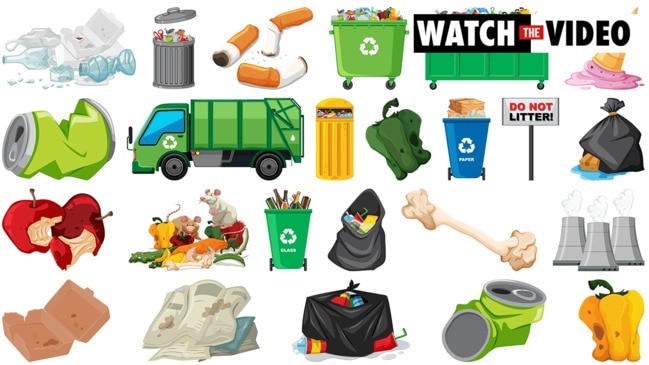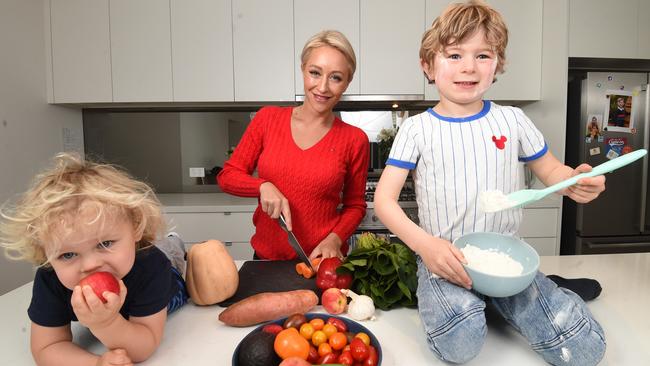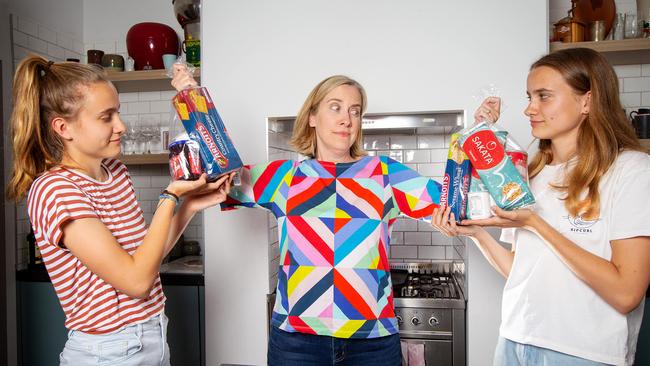Study lifts lid on food waste habits
The average household across the country tosses out almost 5 kilograms of food per week, and that number could easily be reduced if there was more clarity around these two common labels.

Lifestyle
Don't miss out on the headlines from Lifestyle. Followed categories will be added to My News.
Families uncertain about the meaning of ‘use by’ and ‘best before’ labels are needlessly throwing out food.
Only half of households understand both terms, new research has found.
And one in five have admitted tossing out items as a result of their doubt.
Fight Food Waste Cooperative Research Centre chief Dr Steven Lapidge said the confusion was adding to the nation’s huge food waste problem.
Households across Australia turf an average 4.9 kilograms of food each per week – about the equivalent of a fabric shopping bag full per fortnight.
Households are responsible for a third of all food waste.
Food Safety Information Council spokeswoman Lydia Buchtmann said products with a ‘use by’ date must either be eaten or frozen by that time because of safety reasons.
“You can freeze it or cook it into a meal like a casserole or use as pizza topping. Even salad leaves can be added to stir fries,” Ms Buchtmann said.
‘Best before’ dates referred to food quality, rather than safety, and could be eaten after that time.

Dr Lapidge suggested: “Be guided by use by dates but not so much best before. Best before is a conservative date mainly used by manufacturers to make sure you are eating their food in the best conditions, but the food can be just as good after.
“For example, a packet of salt with a best before date is unnecessary.
“We’ve become ultra cautious in our behaviour and automatically throw things out.”
Foods with a shelf life of two years or longer, commonly canned foods, don’t have to carry a ‘best before’ date.
SPC head of innovation Blair Keating said providing the tin was undamaged, consumers could be confident the company’s baked beans would retain taste and nutrition quality for at least two years – and be safe to eat well beyond.
“Baked beans are great for doomsday preppers,” Mr Keating said.
The research centre’s Food Waste National Benchmarking Study summary report revealed fresh vegetables and herbs, uneaten prepared food, and bread and bakery items were among the most commonly ditched.
Dr Lapidge said: “Some of the biggest mistakes are cooking more than we need to, shopping without a list or not planning meals and ending up with too much food, losing track of what’s already in the fridge, and not using up leftovers”.
The study questioned 5272 “household food managers” about their attitudes and habits.

Only half of those responsible for food shopping, preparation, storage and disposal regularly made use of leftovers.
Two in five often prepared extra food ‘just in case’ it was needed.
Fewer than half planned most meals before cooking.
MORE NEWS:
WHY YOUR TRIP TO MORNINGTON PENINSULA JUST GOT LONGER
OUR BIGGEST GRIPES WITH ENERGY RETAILERS
WOMAN HYSTERICAL AFTER NAZI ENCOUNTER AT KMART
And only a third said that they constantly wrote out comprehensive shopping lists.
Mum Kate Lewin said her family was conscious about limiting food waste, but it was sometimes difficult when they were busy.
“We do our best to try to reduce waste and we compost and eat leftovers,” she said.
“We can get caught out when we are in a hurry, as it is harder to plan meals in advance or have everyone home for meals that have been cooked.”
Ms Lewin said she paid most attention to use by dates on products such as milk, cheese and yoghurt.
FOOD LABEL DEFINITIONS:
USE BY – Eat or freeze by the marked date for safety reasons. Appears on foods such as dairy, meat and bagged salad. Also check storage instructions such as ‘keep frozen’ or ‘refrigerate’. Once opened, refrigerate and use within 2 to 3 days unless the package says otherwise.
BEST BEFORE – Refers to food quality, not safety. May lose nutritional value and quality after the marked date. Includes most packaged foods such as biscuits and snacks.
NO DATE – Foods with a shelf life of two years or longer, for example many canned foods, do not need to be labelled with a ‘best before’ date. This is because they will retain their quality for many years, and are likely to be consumed well before they spoil.
BREAD – Can be labelled with a ‘baked on’ or ‘baked for’ date if its shelf life is less than seven days.
Source: Food Safety Information Council
